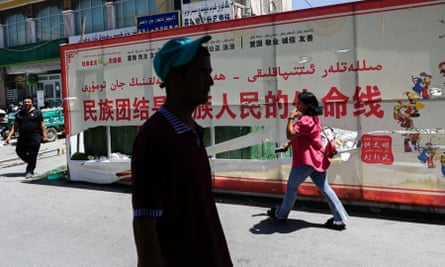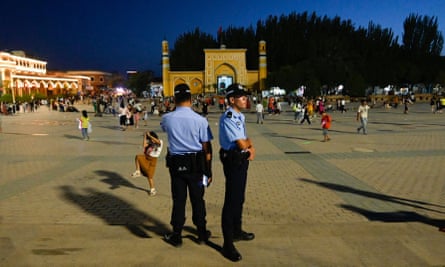An academic publication utilizing genetic information from Uyghur individuals has been withdrawn due to ethical considerations.
There are concerns about the lack of thorough ethical screening by academic publishers for the research they release. This is evident after a study using genetic information from China’s Uyghur population was withdrawn and other publications, including one currently available through Oxford University Press, have come under scrutiny.
Elsevier, a Dutch academic publisher, revoked a 2019 publication titled “Analysis of Uyghur and Kazakh populations using the Precision ID Ancestry Panel” in June.
Chinese and Danish scientists conducted a study on 203 Uyghur and Kazakh individuals residing in Ürümqi, the main city of Xinjiang. They utilized genetic sequencing technology from Thermo Fisher Scientific, a biotech company in the US, to assess the genetic makeup of these two minority groups. The researchers stated that improving DNA sequencing could aid law enforcement in identifying suspects in criminal cases. They also noted the significance of understanding the genetic variation in these populations for a better understanding of their origins and demographic history, which could potentially provide leads for police investigations.
The notice of retraction stated that the article was removed upon the journal’s request, Forensic Science International: Genetics. This was due to an investigation uncovering that the necessary ethical approval was not obtained for the collection of genetic samples.
Mark Munsterhjelm, a professor at the University of Windsor, in Ontario, who specialises in racism in genetic research, said the fact that the paper had been published at all was “typical of the culture of complicity in forensic genetics that uncritically accepts ethics and informed consent claims with regards to vulnerable populations”.
There have been concerns raised regarding a paper published in a journal sponsored by the Chinese Ministry of Justice. The study, titled “Sequencing of Human Identification Markers in an Uyghur Population,” examined Uyghur genetic data based on blood samples taken from individuals in Xinjiang’s capital city, located in north-west China. Yves Moreau, a professor of engineering at the University of Leuven in Belgium, specializing in DNA analysis, expressed worries that the participants may not have given their free consent for their DNA samples to be used. He also stated that the research could lead to increased surveillance of Uyghur individuals.
The study was published in the June 2022 edition of the Forensic Sciences Research (FSR) journal, which was purchased by Oxford University Press in 2023. The study received partial funding from Xinjiang Police College and was written by three of the same researchers as the retracted Elsevier paper.
The journal’s editors and OUP, the publisher, have not yet conducted an ethical review of this submission.
Duarte Nuno Vieira, the co-editor-in-chief of FSR, denied that financial support from China’s ministry of justice had any impact on the journal’s editorial policies, calling the suggestion “ethically objectionable”.
Both articles are founded on investigations carried out in Xinjiang, a region where there are numerous accounts of violations of human rights. In addition to a prevalent system of detainment facilities, individuals residing in this area – predominantly Uyghurs, Kazakhs, and other minority ethnic groups – are subjected to extensive government monitoring.

The Uyghurs are a group of people with Turkic ancestry primarily located in Xinjiang, a region within China. However, their heritage can also be traced back to central Asia and mainland China. There has been ongoing tension between the Uyghurs and Beijing, with the latter accusing many of wanting to secede from Chinese governance.
According to experts, individuals in Xinjiang may lack the ability to provide voluntary consent for involvement in research studies.
In both documents, one of the authors, Halimureti Simayijiang, was connected to China’s state security system through the Xinjiang Police College, intensifying these worries.
According to Maya Wang, a director for Asia at Human Rights Watch, the Uyghurs in China are facing a highly oppressive environment, making it nearly impossible for them to refuse the collection of their DNA.
The Biden administration has recently removed sanctions on the Chinese Institute of Forensic Science, which is part of the Ministry of Public Security. This decision was made in hopes of improving collaboration on controlling fentanyl. The institute had been under sanctions since 2020 due to accusations of mistreatment against Uyghur individuals.
Inquiries regarding connections to China.
On November 19th, Moreau expressed concerns about the study on Uyghur DNA that was published in Forensic Sciences Research.
The 264 Uyghurs who gave blood samples were each required to give written informed consent, according to the article. In an email to Irene Tracey, the vice-chancellor of Oxford University, which was reviewed by the Guardian, Moreau explained that informed consent must be freely given, but he believes this is not possible in the situation in Xinjiang.
A representative from OUP stated that the paper was approved and released by FSR prior to OUP taking over publication of the journal. They have acknowledged that the article underwent peer review and included ethical research statements and disclosures. They have also expressed their commitment to collaborating with the journal’s editors to address any raised concerns and information they have received.
The paper’s authors include Simayijiang, Niels Morling, and Claus Børsting from the forensic genetics department at the University of Copenhagen. Simayijiang is also affiliated with Xinjiang Police College. Elsevier retracted the paper, written by these three scientists and data scientist Torben Tvedebrink, in June.
Simayijiang is no longer associated with the University of Copenhagen, as confirmed by the university. They departed in 2020, before the paper that was retracted and the one that raised concerns were submitted.
Nuno Vieira stated that FSR was unbiased and transparent. He also mentioned that the journal’s editorial board consisted of highly esteemed forensic experts and scholars from around the globe.
He stated his intention to discuss the ethical issues with the appropriate personnel at the journal, and emphasized that there has never been any involvement or intervention from the Chinese Ministry of Justice.

Hans Bräuner, the deputy dean in charge of research at the health and medical sciences department in the University of Copenhagen, stated that following initial concerns regarding the ethical implications of data gathering in Xinjiang in 2020, the university has implemented several measures to strengthen oversight on sensitive research. These include setting up a data management team and creating a security checklist for evaluating potential risks in international research projects.
Two additional studies on the genetic data of Uyghur and Kazakh populations, authored by Simayijiang, Morling, and Børsting, and co-authored by Vania Pereira from the University of Copenhagen, are currently being reviewed for ethical considerations by the journal in which they were published. Bräuner stated that his department was recently informed of potential issues with these papers, which were published in Forensic Sciences International: Genetics, and has been in communication with the editor-in-chief to address the matter.
No response was received from any of the researchers when asked for their comments.
According to specialists, the articles represent only a small portion of scientific studies that may not adhere to ethical guidelines for gathering data. These studies could potentially contribute to the creation of surveillance technologies that violate the human rights of marginalized communities.
In 2019, Thermo Fisher announced that it would discontinue the sale of its equipment in Xinjiang. This decision was made after a paper utilizing their DNA sequencing kit, which was being evaluated, was retracted in June.
In recent times, there has been a rise in examination of scientific studies using samples from Chinese populations who may not have the capacity to give consent freely, specifically minority ethnic groups. Bioethicists initially expressed concerns in 2019, resulting in reputable journals retracting multiple articles utilizing genetic material from minorities.
Researchers claim that publishers continue to readily approve studies that could potentially raise ethical issues, and are not prompt enough in addressing complaints.
Moreau has raised concerns about dozens of papers. In November, he was awarded the Einstein Foundation prize for “forcefully” advocating for “ethical standards in the utilisation of human DNA data”, according to the judging committee.
Based on Moreau’s study, over 20% of forensic population genetics research published in China from 2011 to 2018 was centered on Uyghurs, despite their population being less than 1%. Tibetans have an even higher proportion of research focused on them.
According to Moreau, the study of Uyghurs is intriguing due to their genetic makeup which combines both East Asian and Eurasian ancestry. Similarly, research on Tibetans is noteworthy for their ability to adapt to high altitudes. However, the level of focus on these groups may come as a surprise.
A representative of the Chinese government stated: “China abides by legal governance. The privacy of all Chinese citizens, regardless of their ethnicity, is safeguarded by law.”
Source: theguardian.com

